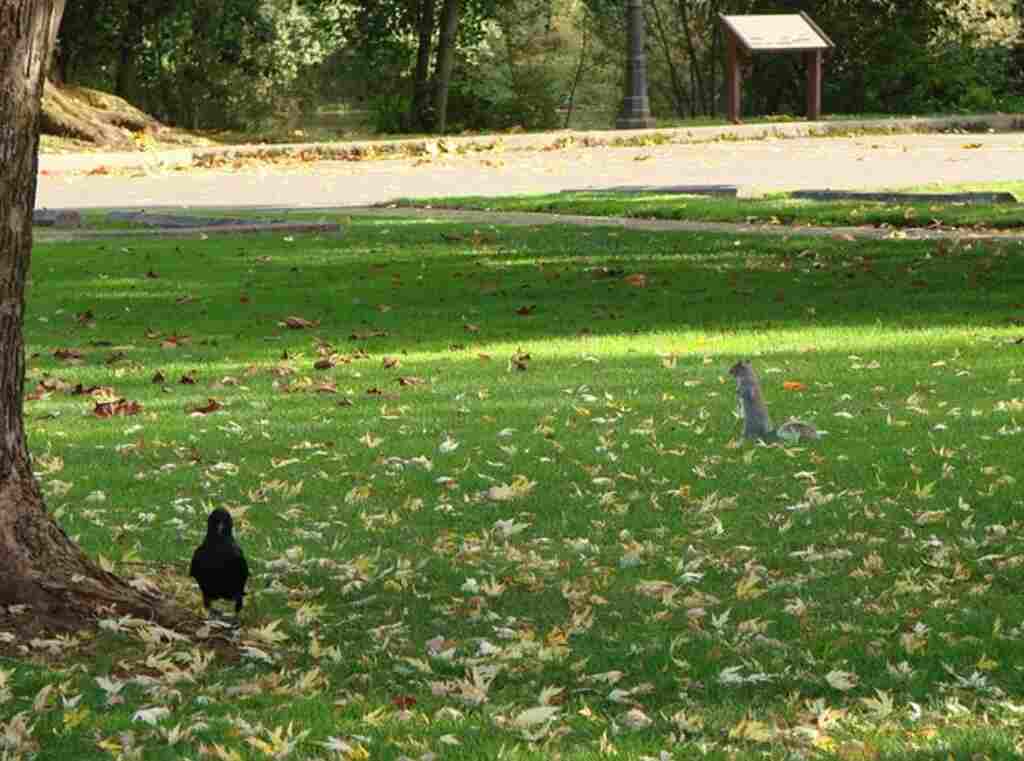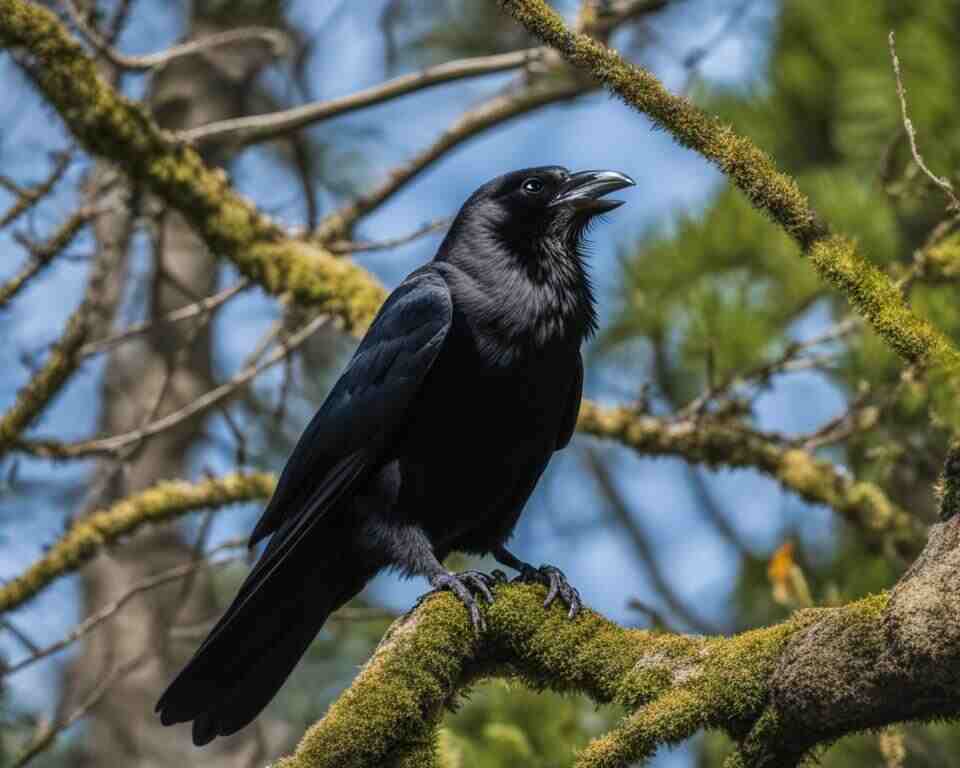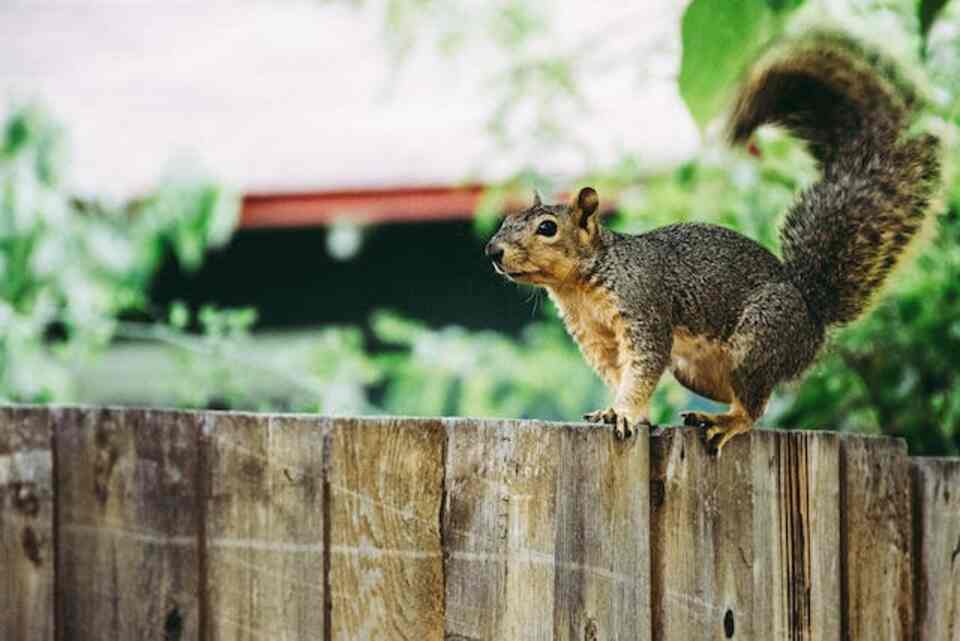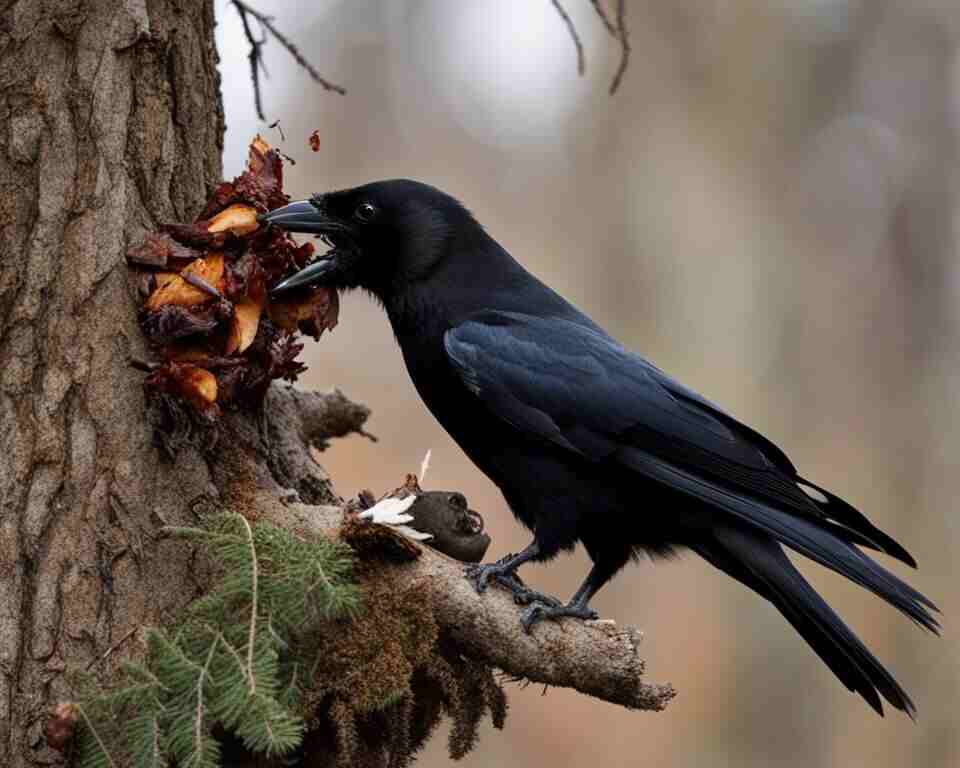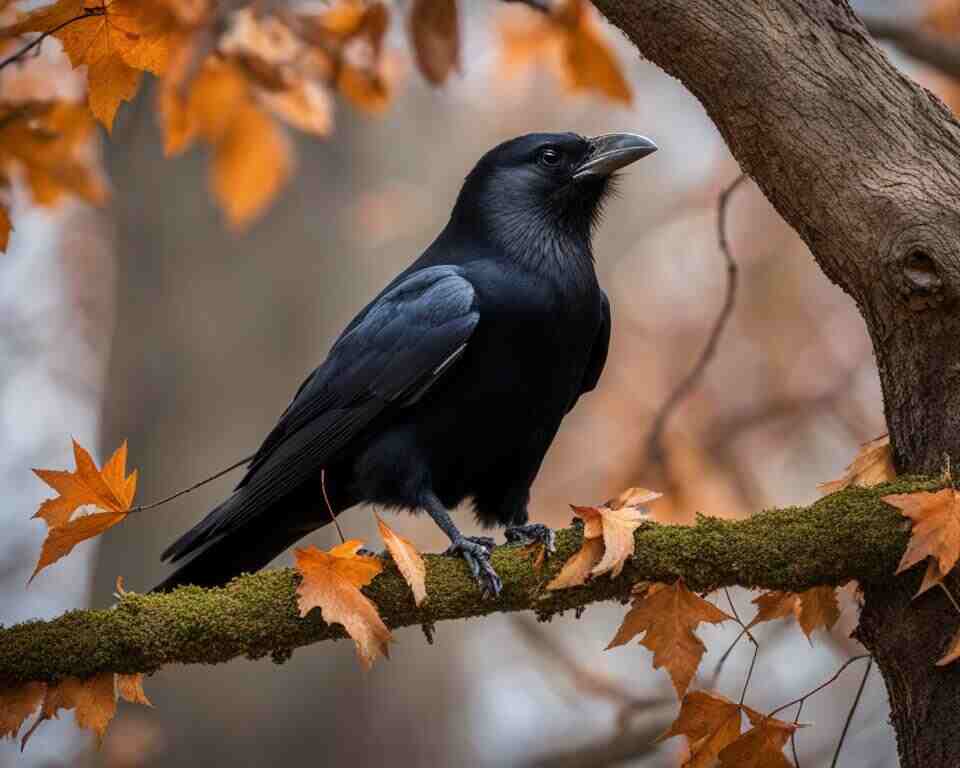Let’s explore the interesting connection between crows and squirrels. Ever wondered if crows hunt and eat squirrels? I’m here to share the lowdown on their behaviors and food preferences. Get ready for a dive into the fascinating world where crows and squirrels cross paths.
Table of Contents
- 1 Key Takeaways:
- 2 Do Crows Eat Squirrels?
- 3 Crows as Scavengers: What Do They Eat Besides Squirrels?
- 4 The Relationship Between Crows and Squirrels: Rivals or Coexist?
- 5 Crows Hunting and Attacking Squirrels: When Does It Happen?
- 6 Crow and Squirrel Interactions: Defense and Territory Protection
- 7 Crows as Opportunistic Feeders: Eating Dead Squirrels
- 8 Squirrel Defense Mechanisms: Fighting Back Against Crows
- 9 Bird Prey Relationships and Urban Wildlife Behavior
- 10 Conclusion
- 11 FAQs
- 11.1 Do crows eat squirrels?
- 11.2 What do crows eat besides squirrels?
- 11.3 What is the relationship between crows and squirrels?
- 11.4 When do crows hunt and attack squirrels?
- 11.5 How do crows defend their territory from squirrels?
- 11.6 Do crows eat dead squirrels?
- 11.7 How do squirrels defend themselves against crows?
- 11.8 What other factors influence the relationship between crows and squirrels?
- 11.9 What can we conclude about the relationship between crows and squirrels?
- 12 Source Links
- 13 Author
Key Takeaways:
- Crows may hunt and feed on small and weak squirrels, particularly during a food crisis.
- Adult squirrels are more challenging for crows to hunt, but baby squirrels or injured ones are easier prey.
- In areas where crows have alternative food sources, they won’t eat squirrels unless they are very young and defenseless.
- Squirrels put up a fight when threatened by crows, but in some cases, crows may mob and attack young squirrels.
- Crows are highly adaptable and have a wide-ranging diet that includes various plant and animal matter.
Do Crows Eat Squirrels?
Crows, omnivorous and opportunistic, occasionally eat squirrels. While their diet mainly includes fruits, seeds, insects, and carrion, instances of crows consuming small mammals like squirrels have been observed, particularly in urban environments.
Crows as Scavengers: What Do They Eat Besides Squirrels?
Crows have a diverse diet and are known as scavengers, feeding on both plant matter and animal prey. While squirrels are not their primary food source, crows will consume a variety of other food items when available. Their scavenging behavior allows them to take advantage of different food sources, ensuring their survival in various environments.
Crows are opportunistic feeders and will eat dead animals, or carrion, that they come across. Along with carrion, crows also feed on a wide range of other food sources, including insects, fruits, grains, and even garbage. They are highly adaptable creatures and can find sustenance from whatever food is accessible to them.
The scavenging behavior of crows plays a vital role in the ecosystem. As avian scavengers, they contribute to the decomposition process by consuming dead animals. This behavior helps to maintain the overall balance of nutrients within the environment and ensures that resources are efficiently utilized.
Crow Scavenging Habits: A Look at Their Diet Preferences
When it comes to scavenging, crows have developed specific food preferences. While they will eat a variety of items, they show a preference for certain types of carrion. For example, crows are more likely to scavenge on smaller mammals, such as rodents or birds, rather than large ungulates.
Additionally, crows are known to scavenge the leftovers from other predators. They may gather around the remains of a carcass and opportunistically feed on any remaining flesh. This scavenging behavior allows crows to obtain nutrients from sources that they may not be able to capture themselves.
In summary, crows are not solely reliant on squirrels as a food source. Their scavenging behavior allows them to adapt to different environments and feed on a variety of food items. By consuming carrion and other available food sources, crows play a crucial role as scavengers in the ecosystem, contributing to the decomposition process and nutrient cycling.
| Food Preferences of Crows | Description |
|---|---|
| Insects | Crows feed on various types of insects, such as beetles, grasshoppers, and worms. |
| Fruits | They consume a variety of fruits, including berries, apples, and cherries. |
| Grains | Crows will scavenge and eat grains, such as corn or wheat, from agricultural fields. |
| Garbage | Being highly adaptable, crows may take advantage of human waste and feed on garbage. |
The Relationship Between Crows and Squirrels: Rivals or Coexist?
When it comes to the relationship between crows and squirrels, it can be a complex and dynamic one. While they are not natural predators or prey for each other, they do have interactions that can vary depending on the circumstances. Crows and squirrels may compete for resources like food and territory, but they can also coexist peacefully in certain situations.
Crows may view squirrels as competition, particularly when it comes to food sources. In areas where food is scarce, crows may attempt to drive squirrels away to secure their own survival.
On the other hand, squirrels may see crows as potential threats and will defend themselves and their nests if necessary. However, in the presence of abundant food sources, both species may be able to share common territories without much conflict.
It’s important to note that the relationship between crows and squirrels can vary depending on individual behavior and specific circumstances. While some crows may actively hunt squirrels, it is not a universal behavior.
Squirrels, on the other hand, have defense mechanisms to protect themselves, and they are not helpless prey. Their ability to fight back and their determination to protect their offspring can influence the dynamics of their interaction with crows.
Table: Comparing Crow and Squirrel Interaction
| Interaction | Nature |
|---|---|
| Competition for resources | Crows and squirrels may compete for food and territory. |
| Coexistence | In areas with abundant food sources, crows and squirrels can share territories without conflict. |
| Predation | While some crows may hunt squirrels, it is not a widespread behavior. |
| Squirrel defense mechanisms | Squirrels have the ability to fight back and protect themselves and their offspring. |
In conclusion, the relationship between crows and squirrels can be a complex interplay of competition, coexistence, and defense. While there may be instances of predation or territorial disputes, it is not a universal pattern. Understanding the behaviors and dynamics of these two species can provide valuable insights into the intricate relationships that exist within ecosystems.
Crows Hunting and Attacking Squirrels: When Does It Happen?
When it comes to the hunting and attacking behavior of crows towards squirrels, there are specific circumstances that trigger such actions. Crows primarily engage in hunting squirrels when they face a food crisis or feel threatened or provoked by the presence of squirrels in their territory.
These intelligent birds often plan their hunting strategies, with group attacks being a common tactic. Multiple crows surround a squirrel, using their sharp beaks, talons, and wings to overpower and subdue their prey.
However, it’s important to note that adult squirrels are less likely to be targeted by crows due to their larger size and ability to defend themselves. Instead, crows tend to focus on hunting baby squirrels or weak adult squirrels that are easier to capture.
In certain cases, crows may also prioritize squirrels as prey if alternative food sources are scarce. Nevertheless, the predation of squirrels by crows is not consistent or widespread.
Overall, the hunting and attacking behavior of crows towards squirrels is an adaptive response influenced by their need for food and a sense of territorial defense.
Understanding these factors can shed light on the complex interactions between these two species in the natural world.
| Crow Hunting Behavior | Squirrel Predation Patterns | |
|---|---|---|
| Characteristics | Intelligent and strategic | Target baby squirrels or weak adults |
| Strategies | Group attacks, surrounding the squirrel | Using sharp beaks, talons, and wings |
| Targets | Food crisis situations or territorial defense | Less likely to target adult squirrels |
Crow and Squirrel Interactions: Defense and Territory Protection
Crows, known for their scavenging behavior, play a territorial role when it comes to squirrels. They perceive squirrels as competitors for resources and will actively defend their territory from them.
Crows are highly social birds and will gather as a community to protect their young and nesting sites from potential threats, including squirrels. If a squirrel enters a crow’s territory, the crows may attack and even kill the squirrel as a defense mechanism.
When it comes to squirrel defense against crows, these nimble creatures are not defenseless. Squirrels have their own set of mechanisms to protect themselves from potential predation. They will fight back by making barking sounds, stamping their feet, and using their sharp paws to defend themselves against crows.
Understanding crow behavior with squirrels, including their territorial behavior and foraging strategies, provides insights into their interaction and the protection of their territory. Meanwhile, squirrel defense mechanisms highlight their adaptability and resilience in the face of potential threats from crows.
Crows as Opportunistic Feeders: Eating Dead Squirrels
Crows are highly adaptable and opportunistic feeders. They are known to consume a wide range of food sources, including dead animals. As carrion-consuming birds, crows scavenge for food to sustain themselves and their young. Dead squirrels, particularly roadkill or carcasses left behind by other predators, provide an easy and accessible food source for crows.
These intelligent birds will not hesitate to take advantage of a freshly killed squirrel, often mobbing and stealing it from other predators such as hawks. Crows use their sharp beaks and claws to tear into the carrion, feeding on the available meat. Their scavenging behavior and adaptability play a crucial role in maintaining the cleanliness of their environment by disposing of deceased animals.
Table: Comparison of Carrion Consumption by Different Bird Species
| Bird Species | Carrion Consumption |
|---|---|
| Crows | High |
| Vultures | Very High |
| Eagles | Medium |
| Hawks | Low |
Table Conclusion: Crows exhibit a high level of carrion consumption, similar to vultures. They play an essential role in removing carcasses and maintaining the ecological balance in their habitats.
Squirrel Defense Mechanisms: Fighting Back Against Crows
Squirrels have developed various defense mechanisms to protect themselves from potential predators, including crows. When faced with a crow, squirrels exhibit remarkable behavior to fight back and ensure their survival. One of the notable defense tactics is vocalization.
Squirrels emit barking sounds to communicate danger and warn other squirrels in the vicinity. This vocalization serves as an alarm system to alert their kind and potentially discourage crows from approaching. Additionally, squirrels use their sharp paws to attack crows that come too close, exhibiting an impressive display of self-defense.
Female squirrels, particularly when pregnant or protecting their young, show immense bravery in defending their nests against crows. With fierce determination, they engage in territorial battles to keep the crows at bay.
Their maternal instincts drive them to sacrifice themselves if necessary, putting up a fight to protect their offspring from potential harm. This shows the remarkable strength and resilience of squirrels when faced with the threat of predation.
Squirrels are not afraid to retaliate when necessary, demonstrating their ability to stand their ground and defend against potential threats.
While squirrels may attempt to flee from crows, they are not defenseless prey. Their hunting behavior shifts to survival mode as they employ various strategies to outmaneuver and fight back against the crows.
It is essential to recognize the remarkable defense mechanisms that squirrels possess, highlighting their resilience and ability to protect themselves and their young.
| Squirrel Defense Mechanisms | Description |
|---|---|
| Vocalization | Squirrels emit barking sounds as an alarm system to warn others and potentially deter crows. |
| Sharp Paws | Squirrels use their sharp paws to attack and defend themselves against crows. |
| Maternal Instincts | Female squirrels fiercely protect their nests and offspring, engaging in territorial battles. |
Bird Prey Relationships and Urban Wildlife Behavior
Understanding the interactions between different species in the natural world is crucial for gaining insights into the complex dynamics of wildlife ecosystems. One such dynamic is the relationship between crows and squirrels, two common urban wildlife species that coexist in many environments.
These inter-species interactions, influenced by bird prey relationships and scavenging behavior, shed light on the intricate web of predator-prey relationships and avian predator-prey dynamics.
Crows, known as bird scavengers, have a wide-ranging diet that includes both plant matter and animal prey. While they are not natural predators of squirrels, they may compete for resources such as food and nesting territories.
Squirrels, on the other hand, possess defense mechanisms and territorial behavior to protect themselves from potential threats, including crows. These conflicting interests can result in intriguing interactions between crows and squirrels, ranging from peaceful coexistence to occasional confrontations.
The unique scavenging behavior of crows also plays a role in shaping their interactions with squirrels. Crows are opportunistic feeders, taking advantage of whatever food sources are available to them. This can include carrion, such as dead squirrels, which provide an easy meal for these intelligent birds.
The scavenging habits of crows contribute to the overall urban wildlife behavior, where various species adapt and interact within the context of human-dominated environments.
“The interaction between crows and squirrels is complex, influenced by natural predator-prey relationships and a variety of ecological factors.”
Overall, the relationship between crows and squirrels exemplifies the intricate nature of inter-species interactions in urban wildlife ecosystems. By studying bird prey relationships, bird scavengers, and scavengers in the animal kingdom, we gain a deeper understanding of how these different species coexist and compete for resources in our shared environment.
Through continued research and observation, we can unravel the mysteries of urban wildlife behavior and appreciate the delicate balance that exists within our cities and towns.
Conclusion
In conclusion, the interaction between crows and squirrels is a complex relationship influenced by factors such as defense mechanisms, territorial behavior, and natural food sources.
While crows have been observed hunting and feeding on small and weak squirrels, this predation is not widespread or consistent. Squirrels, on the other hand, have developed defense mechanisms to protect themselves and their offspring from potential predators like crows.
Both crows and squirrels coexist in certain situations, sharing common territories and food sources. Understanding the dynamics of their interaction can provide valuable insights into the behavior of these urban wildlife species. It is important to acknowledge that the relationship between crows and squirrels can vary depending on ecological factors and the specific circumstances of their environment.
Overall, the predator-prey relationship, scavenging behavior, and bird species interactions contribute to the intricate nature of the crow and squirrel interaction. Studying these interactions not only sheds light on their behavior but also highlights the complex dynamics within the animal kingdom.
As we continue to explore and observe the natural world, a deeper understanding of these interactions will help us appreciate the intricate balance of nature.
FAQs
Do crows eat squirrels?
Yes, crows are known to hunt and feed on small and weak squirrels, particularly if they are facing a food crisis. However, squirrels are not a primary food source for crows and are generally only consumed if other food sources are scarce.
What do crows eat besides squirrels?
Crows have a wide-ranging diet that includes both plant matter and animal prey. They feed on dead animals, insects, fruits, grains, and garbage. They are opportunistic feeders and will eat whatever food sources are available to them.
What is the relationship between crows and squirrels?
The relationship between crows and squirrels can vary. While they may compete for resources such as food and territory, they can also coexist peacefully when there are abundant food sources available for both species.
When do crows hunt and attack squirrels?
Crows primarily hunt and attack squirrels in specific situations, such as during a food crisis or when they feel threatened or provoked by squirrels in their territory. They may also target baby squirrels or weak adult squirrels as they are easier prey.
How do crows defend their territory from squirrels?
Crows are highly territorial birds and will defend their territory and nesting sites from intruders, including squirrels. They may view squirrels as competitors for resources and may attempt to drive them away.
Do crows eat dead squirrels?
Yes, crows are carrion-consuming birds and will scavenge for food, including dead squirrels. They will consume carrion and may even steal freshly killed squirrels from other predators.
How do squirrels defend themselves against crows?
Squirrels have defense mechanisms to protect themselves, including making barking sounds, stamping their feet, and using their sharp paws to attack. Female squirrels, especially when pregnant or protecting their young, will fight off crows that come near their nests.
What other factors influence the relationship between crows and squirrels?
Various factors, such as bird prey relationships, bird scavenging behavior, bird species interactions, and urban wildlife interactions, can influence the relationship between crows and squirrels. Natural predator-prey relationships and avian predator-prey dynamics also play a role.
What can we conclude about the relationship between crows and squirrels?
The interaction between crows and squirrels is complex and can be influenced by factors such as food availability, territorial behavior, and defense mechanisms. Understanding these factors provides insights into their relationship in the wild.

